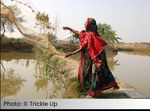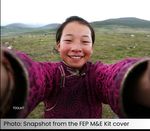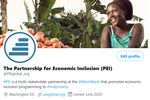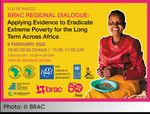We start 2022 with a new PEI Open House! - | Partnership for ...
←
→
Page content transcription
If your browser does not render page correctly, please read the page content below
2/1/22, 2:25 PM m.newsletterext.worldbank.org/rest/head/mirrorPage/@grgMYezzMD8YAJI_UMRuQodi65oXoR9LO34LWea5ib69ymzOQ0tFezS86…
Nov January 2022
NEWS AND RESOURCES FROM PEI
We start 2022 with a new PEI Open House!
Join us on February 9th for PEI Open House! Increasingly, economic inclusion programs are utilizing
behavioral science, the study of how people make decisions and take actions, to help programs achieve
optimal outcomes and participants overcome extreme poverty. This session, co-hosted with ideas42,
moderated by Carolina Trivelli in partnership with the Social Protection and Jobs Global Practice of the
World Bank, will discuss how behavioral science adds value to economic inclusion programs and explore
future directions for the field.
m.newsletterext.worldbank.org/rest/head/mirrorPage/@grgMYezzMD8YAJI_UMRuQodi65oXoR9LO34LWea5ib69ymzOQ0tFezS86aJp-SI3LAb0-hNaY… 1/52/1/22, 2:25 PM m.newsletterext.worldbank.org/rest/head/mirrorPage/@grgMYezzMD8YAJI_UMRuQodi65oXoR9LO34LWea5ib69ymzOQ0tFezS86…
The event will be simultaneously interpreted in Arabic, French, Portuguese, and Spanish.
Register now!
And in case you missed them...
In September, October, and December PEI hosted three other PEI Open Houses:
Watch #FoodSystems Watch #Urban Watch #CostAnalysis
Coming Soon: Insight Resource Center
Watch out for the upcoming launch of PEI's Insight Resource Center, a
one-stop open knowledge hub on economic inclusion. Insight will
provide easy access to hundreds of tools and resources available to
help policymakers and practitioners implement economic inclusion
programming. Users can search, sort and filter, or explore economic
inclusion by topic, or check out the latest featured publications. PEI
encourages submissions for inclusion in the Insight Resource Center
and guidance will accompany the launch for those with relevant
materials. Stay tuned!
Have materials that may be right for Insight? Email us!
Productive Inclusion in Panama with PEI support
PEI supports government economic inclusion programming by
engaging directly with World Bank operations contributing
to government efforts. Through a combination of grant funding and
technical assistance, PEI’s country-level activities have helped
governments make significant progress embedding economic
inclusion approaches within large social protection, livelihood,
agricultural, and financial inclusion programs. Check this video
snippet, currently available in Spanish, showcasing one of the
programs supported by PEI, the Cohesion Social Program, helping
indigenous rural women in Panama by training them in new
agricultural and poultry techniques to increase their production
yields.
NEWS AND RESOURCES FROM PEI PARTNERS
The World Inequality Report 2022 is out
The World Inequality Report 2022 presents the most up-to-date and complete data on
the various facets of inequality worldwide as of 2021: global wealth, income, gender
and ecological inequality. The analysis is based on several years’ work by more than
m.newsletterext.worldbank.org/rest/head/mirrorPage/@grgMYezzMD8YAJI_UMRuQodi65oXoR9LO34LWea5ib69ymzOQ0tFezS86aJp-SI3LAb0-hNaY… 2/52/1/22, 2:25 PM m.newsletterext.worldbank.org/rest/head/mirrorPage/@grgMYezzMD8YAJI_UMRuQodi65oXoR9LO34LWea5ib69ymzOQ0tFezS86…
one hundred researchers from around the world. The report includes a foreword by
2019 economic Nobel prize laureates Abhijit Banerjee & Esther Duflo.
Download it here >
Does mobile money enable women-owned businesses to invest? Firm-
level evidence from Sub-Saharan Africa
This study connects two important findings in Sub-Saharan Africa. First, digital
technologies such as mobile money have become widespread and have increased
investment by businesses, especially in East Africa. Second, women-owned
businesses in the region significantly lag behind their male counterparts in capital
investments. Using data for 16 Sub-Saharan African economies, the study finds a
positive relationship between mobile money use and investment by women-owned
firms; the relationship is statistically insignificant for men-owned firms.
Read more>
"Emprendiendo una Vida Mejor” contributes to the economic recovery
of Honduran families
Amanda's story represents one of the thousands of people who managed to increase
economic resilience to overcome environmental and health shocks, such as the
pandemic. In this article Fundacion Capital present some of the most interesting results
of a research conducted by Uniandes with more than a thousand Honduran families.
Read more >
What ‘Cash Plus’ Programs Teach Us About Fighting Extreme Poverty
This rich op-ed by Dr. Imran Matin, currently the executive director of BIGD (BRAC
Institute of Governance and Development). It has been published in the SSIR about the
long-term impact of cash plus programs such as BRAC's Graduation approach and
other economic inclusion programs.
Read more >
Financial Education Programs (FEP) Monitoring and Evaluation Kit
This financial education M&E toolkit aims to support AFI member institutions in setting
up a system to facilitate management and documentation of evidence on
the effectiveness of their FEPs. This toolkit attempts to provide a step-by-step guide of
how to achieve this goal, describing what should be done, why it should be done and
how to do it. A field-based example is included. The document consists of two key
sections and four stages of developing an M&E toolkit for a FEP.
Get the toolkit >
Village Enterprise Development Impact Bond (DIB)
m.newsletterext.worldbank.org/rest/head/mirrorPage/@grgMYezzMD8YAJI_UMRuQodi65oXoR9LO34LWea5ib69ymzOQ0tFezS86aJp-SI3LAb0-hNaY… 3/52/1/22, 2:25 PM m.newsletterext.worldbank.org/rest/head/mirrorPage/@grgMYezzMD8YAJI_UMRuQodi65oXoR9LO34LWea5ib69ymzOQ0tFezS86…
This case study report covers the Village Enterprise Development Impact Bond, which
aims to raise the income levels of the extreme poor through Village Enterprise’s
microenterprise development programme, known as a Graduation program. It seeks to
equip its program participants with the resources to create sustainable businesses.
Village Enterprise launched the first DIB for poverty alleviation in sub-Saharan Africa in
fall 2017. The DIB directs funding towards measurable results: increases in
consumption and assets of first-time entrepreneurs living in extreme poverty. Stay
tuned for the results which are set to debut early March.
See the case study >
[EVENT] Trickle Up - Building Women’s Resilience in the Face of
COVID-19
Trickle Up’s upcoming International Women’s Day event, Building Women’s Resilience
in the Face of COVID-19. Moderated by Trickle Up’s president, panelists will discuss
the inspiring work being done in response to the pandemic’s continued impact on
women living in extreme poverty. They will also consider our collective efforts critically
— what is working, what isn’t and why? — and explore where research efforts should
be directed.
Register here >
[Event] BRAC Regional Dialogue: Applying Evidence to Eradicate
Extreme Poverty for the Long Term Across Asia
Register today to discuss ways to build more inclusive and robust systems that
strengthen existing poverty eradication efforts in Africa with various organizations such
as the African Development Bank, BRAC Institute for Governance and Development,
BRAC, UNDP, WACSI and more at the #BRACRegionalDialogues. The keynote
speaker will be Mamta Murthi, Vice President of Human Development at the World
Bank.
Register now >
Finance in Displacement: Joint Report
Between 2019 and 2021, a research collaborative between Catholic University
Eichstaett-Ingolstadt, Tufts University, and the International Rescue Committee
conducted research in Jordan, Kenya, Mexico, and Uganda on refugees and migrants,
focusing on those who had been in their host countries between three and eight years.
The aim of our research was to understand how refugees and migrants financially
integrated into their host surroundings and how financial services played a role.
Download it here >
About PEI
m.newsletterext.worldbank.org/rest/head/mirrorPage/@grgMYezzMD8YAJI_UMRuQodi65oXoR9LO34LWea5ib69ymzOQ0tFezS86aJp-SI3LAb0-hNaY… 4/52/1/22, 2:25 PM m.newsletterext.worldbank.org/rest/head/mirrorPage/@grgMYezzMD8YAJI_UMRuQodi65oXoR9LO34LWea5ib69ymzOQ0tFezS86…
Get daily updates on the latest in economic
inclusion!
JOIN US on Twitter to get the latest articles, research, ideas, and events
by PEI, our partners, and colleagues!
The Partnership for Economic Inclusion is a global network that includes national governments, policymakers,
development partners, and nongovernmental and research organizations. PEI is hosted by the World Bank’s
Social Protection and Jobs Global Practice and seeks to formalize partnerships now that will solidify an economic
inclusion network that is global and far-reaching. PEI partners help develop economic inclusion programs and
contribute to evidence-based good practices that can be adapted to local conditions by governments and local or
international agencies. Through their work, each partner is helping build a platform that will refine and enable the
sharing of cutting-edge knowledge about what works in economic inclusion.
Subscribe to our newsletter here
Partnership for Economic Inclusion c/o World Bank Group 1818 H Street, N.W.
MSN G8-800 . Washington, DC 20433
Unsubscribe from this list
Privacy Policy
The content in this E-bulletin is copyrighted. Requests to reproduce it, in whole or in part, should be addressed to peimt@worldbank.org. For
more information visit our website:http://www.peiglobal.org
m.newsletterext.worldbank.org/rest/head/mirrorPage/@grgMYezzMD8YAJI_UMRuQodi65oXoR9LO34LWea5ib69ymzOQ0tFezS86aJp-SI3LAb0-hNaY… 5/5You can also read



























































